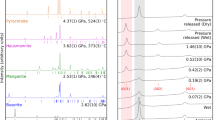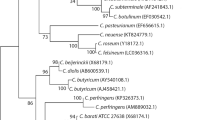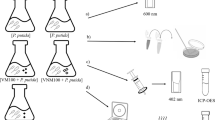Abstract
MANGANESE dioxide in appreciable amounts has been found in the vicinity of active hot and cold springs in several localities in Japan. A mineral spring near Komagadake, Hokkaido, is especially interesting, because manganese dioxide is found in the process of deposition. We have examined the mechanism of precipitation of manganese by bacteria in this spring.
This is a preview of subscription content, access via your institution
Access options
Subscribe to this journal
Receive 51 print issues and online access
$199.00 per year
only $3.90 per issue
Buy this article
- Purchase on Springer Link
- Instant access to full article PDF
Prices may be subject to local taxes which are calculated during checkout
Similar content being viewed by others
References
Baier, C. R., Geologie der Meere und Binnengewässer, 1, 325 (1937).
Zapffe, C., Econ. Geol., 26, 799 (1931).
Hariya, Y., and Kanari, N., Science (Japan), 32, 316 (1962).
Author information
Authors and Affiliations
Rights and permissions
About this article
Cite this article
HARIYA, Y., KIKUCHI, T. Precipitation of Manganese by Bacteria in Mineral Springs. Nature 202, 416–417 (1964). https://doi.org/10.1038/202416b0
Issue Date:
DOI: https://doi.org/10.1038/202416b0
This article is cited by
-
Precipitation of manganese oxides on the surface of construction materials in the Khmer temples, Cambodia
Heritage Science (2016)
-
Biogenic wad in Iron Ore Group of rocks of Bonai-Keonjhar belt, Orissa
Journal of the Geological Society of India (2012)
-
Hydrogen isotopic composition of MnO(OH) minerals from manganese oxide and massive sulfide (Kuroko) deposits in Japan
Contributions to Mineralogy and Petrology (1981)
-
Microbial oxidation of manganese in hydro-electric pipelines
Antonie van Leeuwenhoek (1967)
Comments
By submitting a comment you agree to abide by our Terms and Community Guidelines. If you find something abusive or that does not comply with our terms or guidelines please flag it as inappropriate.



